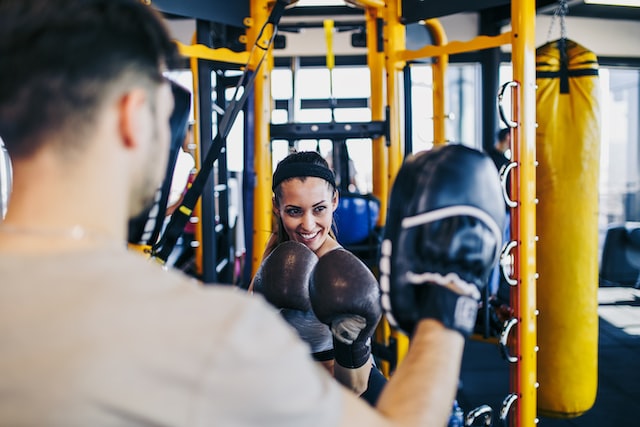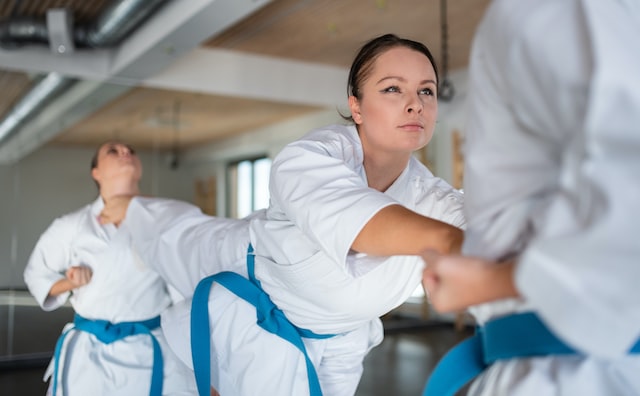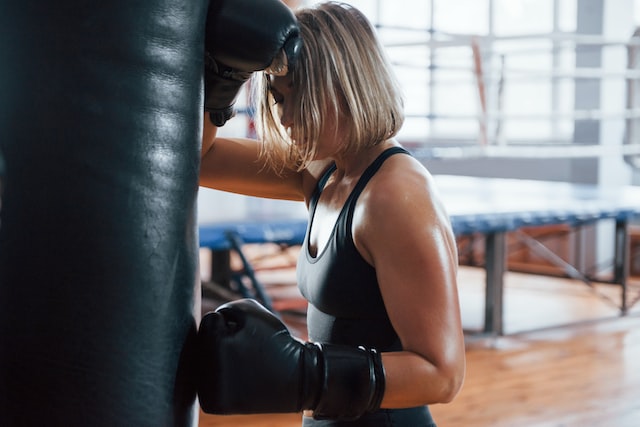Self-Defense for Women
Some listeners and readers may be triggered by this content and listener and reader discretion is advised.
Millions of women endure various forms of violence all throughout the world every day. While there is no single answer to solve this problem, the idea of self-defense could be one option. Self-defense can not only help women protect themselves physically. It can also empower women by instilling confidence and control over their safety.
Our guest for this week’s podcast episode was Leslie Lew. Leslie is the Founder of Reclaiming Your Courage, a Trauma-informed Self-Defense Coach, international best-selling author, and speaker. Her mission is to save the lives of women and allies globally. Leslie is a second-generation Korean and Chinese American, San Francisco native, mother of two, and wife.
She is a two-time black belt and has been a martial artist for over 20 years.
Having experienced violence on many occasions and in different ways, Leslie understands the dangers women face. Leslie empowers purpose-driven women to ignite their strength through their mind, body, and voice. At the start of the pandemic, Leslie was deeply impacted by the rise of anti-Asian hate crimes. She has dedicated her life to stop Asian hate and strengthening her community.
“Self-defense is not just a set of techniques, it's a state of mind that begins with the belief that you are worth defending.”
- Rorion Gracie
Self-defense is not simply a way to protect yourself from physical injury; it may also make you feel more secure and in control of your own safety. It may be an empowering tool for women who would otherwise feel exposed in certain situations, allowing them to protect themselves and their loved ones.
Why Is Self-Defense Important?
Women are frequently victims of violence, such as sexual assault, domestic violence, and street harassment. We often cannot rely on others for our safety and learning to defend ourselves can provide us with the skills and resources we need to protect ourselves. Self-defense can also be an important part of gaining confidence and control over our own safety. Learning how to defend ourselves physically and emotionally might make us feel more confident in other aspects of our lives. Self-defense training can also help us recognize and avoid potentially risky situations.

Besides empowering us, being able to defend ourselves can also lower the likelihood of violence against us. Violence perpetrators frequently target women they perceive to be vulnerable or easy targets. We can become less vulnerable and less likely to be targeted by learning and practicing self-defense techniques. Although, admittedly, self-defense doesn’t solve the larger, global problem we face, it can help us feel safer.
Ultimately, self-defense can be a vital strategy for protecting ourselves; feeling confident; and decreasing our vulnerability to violence. We can take an active role in our own safety and wellbeing by learning how to protect ourselves, which can have a beneficial impact on our life.
Especially if you have daughters, self-protection may be an important topic to raise with them. We all hope our children never have to face harassment or bullying, but statistics show a different reality. Being aware and prepared can help young girls become more confident and able to cope with challenging situations.
Self-Defense Techniques
There are two types of self-defense: physical and non-physical. Martial arts, boxing, and other combat sports are examples of physical self-defense practices. These include using physical force to protect yourself from an assailant. Non-physical self-protection strategies include employing verbal assertiveness, de-escalation techniques, or self-defense gear such as pepper spray or personal alarms.
Physical Self-Defense
Physical self-defense techniques mean employing physical force to defend yourself against an attacker. These strategies can be quite effective in stopping an attack or providing a means of escape. A moment of surprise could be enough to get away and find help. Some of the best-known physical self-defense tactics are:

The phrase “Martial Arts” refers to a wide range of styles and techniques, including karate, judo, taekwondo, and many others. Martial arts instruction can teach you the physical and mental skills you need to protect yourself against an attack.
Boxing is a sport in which two people punch each other with gloved fists. Boxing training can provide you with the physical power and endurance you need to defend yourself in a physical fight.
Kickboxing is a very effective type of self-defense that incorporates aspects of boxing and martial arts. It entails kicking and hitting an opponent and can be an extremely effective method of stopping an attack.
Physical self-defense tactics take a lot of training and practice to be effective. They also require physical strength and endurance, which might not be ideal for everyone. It’s important to choose a technique that’s appropriate for your physical ability and to work with a trained instructor to avoid injury.
While physical self-defense tactics can be quite successful, it is critical to understand that they should only be employed as a last resort. Other self-defense strategies, such as verbal assertiveness or self-defense tools, may be more appropriate in many circumstances.
Non-Physical Self-Defense
Non-physical self-protection techniques mean employing non-physical tactics to defend yourself against an attacker. These strategies can be quite helpful in de-escalating a potentially violent situation or preventing an attack. Non-physical self-defense tactics that are commonly used include:
Verbal assertiveness is the use of clear communication to establish boundaries and express yourself in potentially risky situations. Using forceful and confident words, making eye contact, and speaking in a strong and authoritative tone are all examples of this.
De-escalation strategies entail the use of nonviolent tactics to calm down a potentially violent scenario. This includes keeping calm and composed, paying close attention to the other person, and employing empathy to reduce tension.
Self-defense tools can protect you from an attacker without using physical force. Pepper spray, whistles, air horns, personal alarms, tasers, and other devices that can be carried on you or in your purse are all examples.
Non-physical self-defense strategies can be quite useful in averting an attack or giving you some time to escape the situation. They are also less physically demanding and need less strength and endurance than physical self-defense tactics. Yet, to be effective, they still require training and practice, particularly with verbal assertiveness and de-escalation tactics.
Non-physical self-defense strategies are not always applicable in all situations. Physical force may be required sometimes to stop an attack or create an opportunity to flee. It is important to select an appropriate self-defense technique for a particular situation and to make sure you have proper training and guidance.
Self-Defense and Empowerment
One thing Leslie speaks about in today’s episode is empowerment. Self-defense can help empower women by providing them with the skills and confidence they need to defend themselves. Practicing self-protection techniques can help you feel more in control of your safety and reduce your chances of being harmed. Self-defense can also help boost self-confidence, as well as resist gender stereotypes and cultural expectations that limit a woman’s sense of agency and control over her life.

Increasing Self-Confidence
Self-defense can be a powerful technique for boosting your confidence. You can gain control over your safety and feel more empowered in potentially harmful situations by learning self-defense techniques. Developing confidence through self-defense can involve a variety of tactics. Physical approaches to develop physical strength and endurance are one option. Taking self-defense lessons, practicing martial arts or boxing, or participating in other physical activities that increase strength and stamina can all help.
Another strategy is to practice mental preparedness. This can include imagining potentially risky circumstances and rehearsing appropriate responses. This can help increase your confidence and your sense of control over your own safety.
Ultimately, developing self-confidence through self-defense is a sound approach for women to actively take part in their own safety and well-being. You can gain the confidence you need to protect yourself and live without fear of violence by practicing physical and mental techniques and questioning conventional expectations and prejudices.
Feeling Safer
Taking responsibility for your own safety is an important aspect of self-defense. It entails identifying potential hazards and taking proactive efforts to lessen the possibility of injury. And it means protecting yourself in potentially hazardous situations.
Creating a safety plan is one approach to taking charge of your safety. A personal safety plan details the steps you can take to protect herself in potentially risky situations. It's important to create a safety plan ahead of time to ensure that you are prepared in the event of an emergency. You can practice the steps in your plan, so you know what to do without thinking about it, should the time come.

Developing a Sense of Belonging
Developing a sense of community is another important aspect of self-defense. You can benefit from community support by receiving the resources, encouragement, and empowerment you may need to stay safe and protect yourself.
Joining a self-defense class or association is one way to foster a sense of community. These venues can help you learn and practice self-defense tactics, as well as interact with others who have similar experiences and goals. They can also create a safe and empowering space for you to connect and share knowledge and resources.
Finding and joining neighborhood organizations that fight to prevent violence against women is another approach to develop a sense of belonging. These groups often offer self-defense classes, as well as opportunities to connect with others who share the aim of ending violence against women.
It is equally important to recognize the importance of personal ties in developing a sense of community. Developing supportive relationships with friends, family, and other trustworthy allies can make you part of a strong network of support and empowerment.
The Takeaway
Self-defense can be an effective strategy for empowering women while also promoting their safety and well-being. Women can gain control over their safety and lessen their risk of damage by studying self-protection tactics. Self-defense can also boost confidence, dispel gender stereotypes, and foster a sense of belonging and support.
Self-defense can be an important part of women’s safety and empowerment because it gives them the skills, information, and confidence they need to defend themselves against violence. Women are more likely than men to be victims of violence, and self-defense can be an effective tool in minimizing this risk.

There are many self-defense strategies to select from, including physical skills such as martial arts or boxing. As well as non-physical techniques such as verbal assertiveness or de-escalation. It is important to choose a way that works for you, considering your physical ability, personal preferences, and potential threats in your everyday life.
It is also crucial to keep in mind that self-defense does not always ensure protection.
Women may confront challenges beyond their control that might keep them from being able to physically defend themselves. Non-physical self-defense techniques or seeking help from others may work better in these situations.
We can create a more just and fair society where all women can thrive by working together to foster safe and supportive communities, challenge gender stereotypes, and promote gender equality.
Ultimately, supporting women’s self-defense is about creating a world in which women can live without fear of violence.
